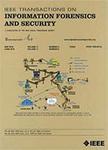版权所有:内蒙古大学图书馆 技术提供:维普资讯• 智图
内蒙古自治区呼和浩特市赛罕区大学西街235号 邮编: 010021

作者机构:Changsha Univ Sci & Technol Sch Comp & Commun Engn Changsha 410114 Peoples R China Nanjing Univ Informat Sci & Technol Engn Res Ctr Digital Forens Minist Educ Nanjing 210044 Peoples R China Changsha Res Inst Min & Met Co Ltd Changsha 410012 Peoples R China North China Inst Comp Technol Beijing 100083 Peoples R China Tech Univ Munich Fak Informat D-85748 Munich Germany Nanjing Univ Sci & Technol Sch Comp Sci & Engn Nanjing 210094 Peoples R China
出 版 物:《IEEE TRANSACTIONS ON INFORMATION FORENSICS AND SECURITY》 (IEEE Trans. Inf. Forensics Secur.)
年 卷 期:2025年第20卷
页 面:1582-1596页
核心收录:
学科分类:0808[工学-电气工程] 08[工学] 0812[工学-计算机科学与技术(可授工学、理学学位)]
基 金:National Natural Science Foundation of China [61972057, 62472226, 62176126, 62172059] Natural Science Foundation of Jiangsu Province, China [BK20230095]
主 题:Image retrieval Codes Semantics Training Robustness Approximation algorithms Quantization (signal) Vectors Hash functions Hands Degraded image large-scale image retrieval locality-sensitive self-supervised deep hashing
摘 要:Recently, numerous degraded images have flooded search engines and social networks, finding extensive and practical applications in the real world. However, these images have also posed new challenges to conventional image retrieval tasks. To this end, we introduce a new task of retrieving degraded images through deep hashing from large-scale databases, and further present the Locality-Sensitive Hashing Network (LSHNet) to tackle it in a self-supervised manner. More specifically, we first propose a triplet strategy to enable the self-supervised training of LSHNet in an end-to-end fashion. Due to the designed strategy, the highly semantic similarity and discrimination of degraded images are well-preserved in our learned latent codes without requiring additional human labor in labeling tons of degraded images. Moreover, to tackle large-scale image retrieval efficiently, we further propose to transform the latent codes into locality-sensitive hashing codes such that the degraded images can be retrieved in sublinear time with their representation ability almost unaffected. Extensive experiments are conducted on three public benchmarks where the results demonstrate the superior performance of LSHNet in retrieving similar images under degraded conditions.